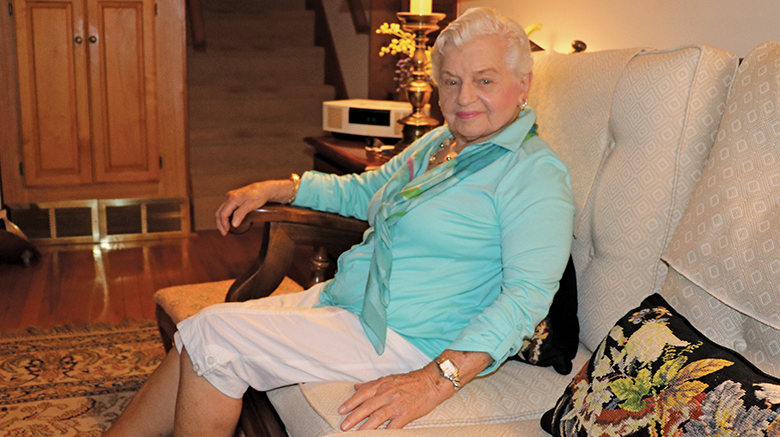Ninety-nine-year-old Loretta Dittenhoefer loves math.
The 1941 St. Joseph’s College graduate said she’s always had a “natural bend” for numbers and equations. To her, math is greater than other studies — such as English and social studies — because an equation can only have one right answer.
Ms. Dittenhoefer’s gift for calculating math problems made it easy to pick a major when she enrolled at SJC Brooklyn — she would study math so she could teach the subject in a high school setting. It was the perfect plan; Ms. Dittenhoefer would then be able to pass on her love of numbers to hundreds of students.
But along the way, she hit a roadblock: schools rarely hired women to teach math in the 1940s.
To this day, Ms. Dittenhoefer vividly recalls the moment she learned her gender would keep her from living her dream as a math teacher.
“The first thing I did in September is take my little sheep skin (diploma) and go down to the Board of Education in Brooklyn, and I told them I wanted to get on the list to be a math teacher,” she said. “I can’t remember who it was who interviewed me, but she said ‘We prefer male teachers for science and math.’ She said, ‘You can go on the list, but we give them preference.’”
Seated on a wooden couch in her living room — donning pink lipstick and a perfectly accessorized outfit — Ms. Dittenhoefer recalled the sinking feeling she felt when she heard the devastating news.
“They weren’t talking about discrimination so much against women then,” she said. “But I thought that sounded very peculiar to me. I didn’t like it.”
While Ms. Dittenhoefer never had the chance to teach math, her desire to encourage students to appreciate numbers the way she does never faded. In fact, she credits her passion for math as one of the main reasons she became a member of the Aquinas Society, a special group of individuals who have made a long-term investment in the future of St. Joseph’s, naming the College as a beneficiary in their will or planned-giving vehicle.
Susan Loucks, a planned giving officer for St. Joseph’s, said the Aquinas Society donations play a huge role in the College’s ability to keep delivering robust offerings.
“Our Aquinas Society members are people who have invested in the future of St. Joseph’s, and we are especially grateful for their foresight and generosity,” Ms. Loucks said. “You don’t have to be wealthy to include the College in your estate plans; even a relatively small estate gift makes a big impact.”
Ms. Dittenhoefer said she specifically requested that her gift be used toward scholarships for math majors — to help nourish the brains of other students who have a bend for math.
Although Ms. Dittenhoefer’s dreams of being a math teacher didn’t go as planned, the outgoing intellect still enjoyed a full career after graduating from SJC Brooklyn. She spent a short stint during the end of World War II producing precision instruments for the war while employed at Sperry Corporation, a now-defunct equipment and electronics company that was located in Lake Success, New York.
Ms. Dittenhoefer said she felt fulfilled by the work, explaining it required her to regularly solve mathematic equations. But her career would soon be derailed again due to her gender. When the men came back from the war, she was fired from her job at Sperry, she said.
For the rest of her career, Ms. Dittenhoefer worked at an insurance company and as a manager at a business office.
She retired early, in 1978 at 57, to care for her sister, Eileen Mary, who suffered from cerebral palsy.
Eileen Mary Dittenhoefer died in 2000 at 78, but her memory remains plastered throughout Ms. Dittenhoefer’s rustic Melville home. In her home, Ms. Dittenhoefer pointed to several pieces of her sister’s intricate needle point work — including a picture of two deer in a snowy forest above her couch and the floral pillows next to her.
The house, where Ms. Dittenhoefer has lived for several decades, also holds evidence of her own hobbies. Tucked in a corner of her living room sits a Yamaha organ that Ms. Dittenhoefer has been playing classical music on for years.
When Ms. Dittenhoefer isn’t playing a tune on her organ, she’s often found listening to one of her collection of more than 100 vinyl records. She used to play the violin, but was forced to stop when arthritis crept into her hands.
“I miss it,” she said. “I look at it every day.”
Oftentimes on Sunday afternoons, Ms. Dittenhoefer will play classical music on her CD or record player softly in the background as she reads a book she selected from the large print section of the Half Hollow Hills Community Library. She pays biweekly visits to the library, bringing home anywhere from five to six books per trip.
Ms. Dittenhoefer said her choice in literature depends on what she feels like learning about that given week.
“I like biographies, mostly,” she said. “I like to read books about things that I’ve heard but then I don’t know what it means. For a long time, I thought about [Albert] Einstein and his famous formula for relativity.”
A wave of excitement rushes over Ms. Dittenhoefer’s face, as she explained the famous physics equation, E=mc2, that represents the correlation of energy to matter.
While the contents of the book were dense, the hardest part for Ms. Dittenhoefer was sitting in a bright enough spot to read the words on the page.
“I’m very lucky I have eyes,” said Ms. Dittenhoefer, noting she copes with Macular degeneration, a common but severe vision loss that usually targets people over 65. “I don’t complain. God has been good to me.”

